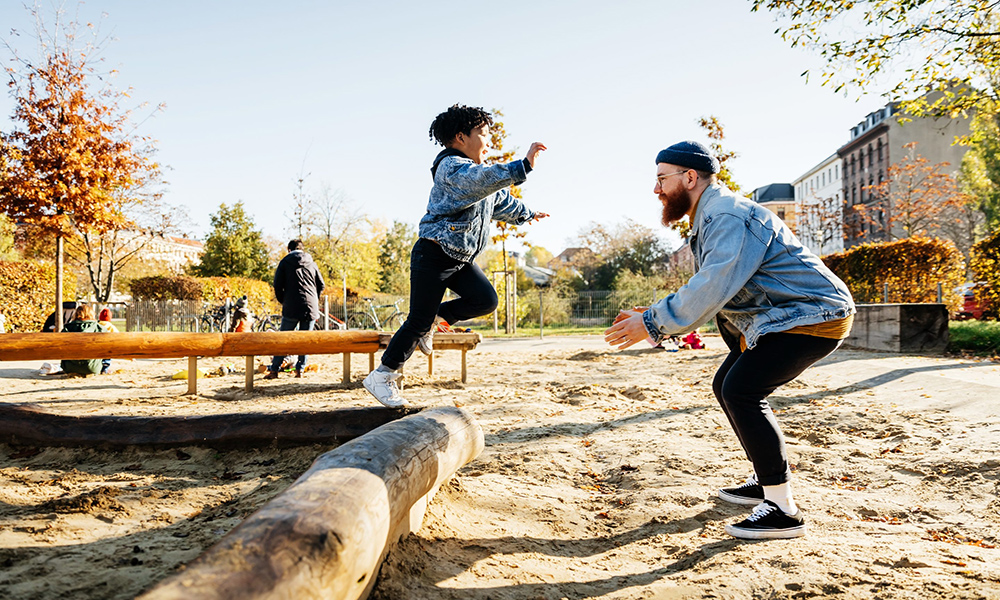
42歲那年,庫爾特·威爾為了照顧剛出生的孩子辭去了工作。
當(dāng)時他正供職于道瓊斯(Dow Jones),簽的是定期聘用合同。通勤是一件異常痛苦的事情,往返幾乎四個小時,而且他的薪資基本與聘請保姆的成本相當(dāng)。
與此同時,他的妻子在時代華納公司(Time Warner)擔(dān)任公司內(nèi)部的反壟斷律師,有著“更好的職業(yè)前景”,他對《財富》雜志表示。
因此,兩口子“很快決定”由威爾居家照顧女兒,以及兩年后出生的兒子。
像他這樣的父親越來越多,他們承擔(dān)的都是義務(wù)工作,包括當(dāng)孩子的司機(jī)、保姆、清潔工和私人廚師,不過這一角色在歷史上始終都是由母親來承擔(dān)。
皮尤研究中心(Pew Research Center)新發(fā)布的分析顯示,如今,全職奶爸在全職父母中的占比達(dá)到了18%。
然而,當(dāng)威爾在20年前開始成為全職奶爸時,居家父親少的可憐,在千禧年之交時的比例僅有5%。
過去30年,這個數(shù)字幾乎翻了一番。威爾說:“可以肯定的是,無論在一天的哪個時間段,我都看到有更多的父親在游樂場陪孩子。”
大衛(wèi)·默里·瓊斯也是一位新時代全職奶爸。
他剛剛辭去了其廣告銷售工作,以照顧其第三個孩子佩吉,而他的妻子梅格則經(jīng)營著自己的公司Postpartum Plan。
默里·瓊斯說:“與孩子們相處是一件非常不可思議的事情,積極融入學(xué)校工作以及社區(qū)亦是如此。如果遇到問題,學(xué)校如今就會通知我和梅格,而且我已經(jīng)加入了班級的WhatsApp群。”
為什么全職奶爸會突然增多?
皮尤的研究稱,美國居家奶爸的比例此前受到了經(jīng)濟(jì)下行的助推,2008年金融危機(jī)期間,居家奶爸的比例便出現(xiàn)了激增。
然而,隨著經(jīng)濟(jì)的增強(qiáng),全職奶爸的比例逐漸下滑,直到新冠疫情爆發(fā)。
即便在英國,研究顯示,居家奶爸的數(shù)量在新冠疫情期間增長了三分之一。這一現(xiàn)象凸顯了全球文化的轉(zhuǎn)變,因為很多男性首次被迫在遠(yuǎn)程工作時承擔(dān)照顧孩子的責(zé)任。
與之前的幾代人不同的是,如今的父親不僅僅是因為最近的沖擊或生病導(dǎo)致的失業(yè),才開始照顧自己的孩子。
研究顯示,越來越多的男士選擇待在家中的唯一原因就是照顧其家人和家庭,而不是因為生病、退休或無法找到工作。
最終,很多父親如今都特意選擇帶孩子而不是養(yǎng)家糊口。
為什么會突然改變想法?《財富》雜志采訪的多位全職父親提到了社會對男性期許的轉(zhuǎn)變——即不再做家庭的男主人,或不健康地壓抑自身情緒,他們稱這種轉(zhuǎn)變是越來越多的父親選擇居家照顧孩子的關(guān)鍵因素。
默里·瓊斯說:“男性開始意識到,他們錯過的重要早間和睡前時光越來越多。”

此外,在大多數(shù)情況下,成為居家奶爸也有其經(jīng)濟(jì)合理性。
隨著越來越多的女性在職業(yè)穩(wěn)定性以及收入方面超過其配偶,越來越多的父親就成了收入較低的一方,并因此而離開工作,開始照顧孩子。
成為居家奶爸的董事總經(jīng)理弗蘭克·哈蒙告訴《財富》雜志:“當(dāng)時,我的妻子梅甘是美國最大的家庭律所Schiller, DuCanto & Fleck LLP的高級合伙人,而且她希望繼續(xù)追求其事業(yè),成為公司的執(zhí)行合伙人。”
他說:“很明顯,最好的解決辦法就是我成為全職父親,這樣,我的妻子就能夠繼續(xù)發(fā)展其事業(yè),并追求其職業(yè)抱負(fù)。我們的觀點當(dāng)時是,而且依然是,我們會共同掌管家庭,這意味著無論誰更適合擔(dān)任某個角色或承擔(dān)某項職責(zé),那么就由誰來做這件事情。”
威爾回答說:“可以毫不夸張地說,每一位成功高管的背后總有一位有時間并愿意打理家庭事務(wù)的配偶。”
益處多于弊端
與全職太太一樣,放棄自己工作來照看孩子的主要弊端就是可能會與世隔絕。
威爾警告道:“我喜歡社交和參與理智探討,但我現(xiàn)在成天跟兩個嬰兒混在一起。每天的工作,尤其是孩子還小的時候,都異常單調(diào)乏味。”
相對來講,全職奶爸的比例依然不高,而且有意思的是,我們也很難找到其他有著類似想法的成年人,并與其溝通。
在哈蒙的眼中,冬天對全職奶爸來說尤為難熬。
他說:“在夏天,找人一塊打高爾夫、航行或共進(jìn)午餐并非難事。”然而,隨著天氣變得糟糕,而且無法打高爾夫,更加寒冷的季節(jié)變得漫長而又孤獨。
實際上,放棄職業(yè)成為全職奶爸的另一個明顯弊端在于——放棄自己的職業(yè)。
這也是為什么一些父親對《財富》雜志表示,他們依然會留意職場的原因,他們會承擔(dān)兼職工作,或在特定的時間辭去工作來照看孩子,而不是永遠(yuǎn)離開職場。

最終,在所有《財富》雜志采訪的父親看來,與他們與孩子建立的感情相比,成為全職奶爸的缺點就不值一提了。
讓-路易斯·薩法里表示:“成為全職奶爸的益處比我想象的要好多了。”他在2004年放棄了自己在金融服務(wù)行業(yè)的工作,轉(zhuǎn)而居家照看孩子。
“居家的這段日子讓我與孩子們變得無比親近。我不僅深入了解了每個孩子的個性,同時也對自己有了更多的了解。”
確實,有父親陪伴對孩子而言是一件非常好的事情。然而很明顯,父親在育兒方面的長期參與對孩子和父親來說都是有益的。
其一,威爾強(qiáng)調(diào)稱,與孩子一道在家中/公園/游樂場/學(xué)校嬉鬧要遠(yuǎn)好于在小隔間里工作一天。此舉也讓他有時間來追求其自身愛好,并管理家庭的各種財產(chǎn)。
哈蒙對比表示同意,他指出:“成為居家奶爸之后,進(jìn)行訓(xùn)練跑、物理療法以及按摩預(yù)約也更加方便,如果我在外全職工作的話,這些就都很難實現(xiàn)。”
與此同時,默里·瓊斯稱,他休了六個月時間的假來照看家中新增添的人丁,這對他的婚姻十分有利。
他說:“這樣做不僅對孩子好,也有利于我們的夫妻關(guān)系。我十分幸運的是,我的工作能夠讓我休這么長時間的假,來支持我的妻子,并與孩子們相處,我認(rèn)為,應(yīng)該允許更多的配偶將這種長假作為標(biāo)配。”
事實上,對于用換尿布來替換發(fā)電子郵件一事,所有《財富》雜志采訪的居家奶爸都不曾感到有任何后悔。
他們在照看孩子之余都做什么
最終,孩子們會長大然后上學(xué),因此全職居家的必要性可能會隨著時間的推移而降低。
然而,在休假照看孩子之后再次回歸工作并重塑職業(yè),這件事本身就是一個巨大的障礙,至少對母親而言是這樣的。
在很大程度上,照看孩子對于《財富》雜志采訪的全職奶爸的職業(yè)來說并沒有什么不利影響。
默里·瓊斯打算在9月回歸工作,而且哈蒙在三年前便加入了投資管理公司美林(Merrill),擔(dān)任私人財富經(jīng)理。
與此同時,薩法里在照看孩子的同時還干起了兼職工作。
他說:“在我當(dāng)奶爸的過程中,我嘗試通過多種方式來維持生活平衡,同時為家庭財務(wù)做貢獻(xiàn)。”薩法里還表示自己曾經(jīng)嘗試做過Uber的司機(jī),然后又成為了Rubi Rides的“創(chuàng)建司機(jī)”,這是一家專為兒童打造的拼車服務(wù)公司。
他說:“零工經(jīng)濟(jì)以及像Rubi這樣的解決方案可以讓父親和全職父母做到魚與熊掌兼得,也就是既能照顧好孩子,又可以擁有穩(wěn)定的收入。”
另一方面,威爾的女兒如今即將邁入大學(xué),然而他依然在照看家庭。
威爾一開始并沒有打算一直做全職奶爸工作。他說:“當(dāng)妻子和我開始踏上這條道路時,其實我們也不確定我是否能夠成天圍著孩子轉(zhuǎn)。”
然而隨著孩子的長大,威爾并沒有覺得自己渴望回歸職場。
在拿到國際關(guān)系的博士學(xué)位之前,他還從事過一系列工作,從金融信息一直到滑雪教學(xué),威爾說,他并沒有與任何工作或行業(yè)進(jìn)行“捆綁”。
此外,威爾在家里還有很多工作需要打理,包括管理夫妻財產(chǎn),以及全面翻修位于布魯克林的一棟赤褐色砂石建筑。
如今,剛剛度過60歲生日的他又拿到了另一項翻修工作,一棟位于伯克希爾的房子,接下來將占用其兩年到三年的時間。
威爾補充說:“有時候我會覺得挺遺憾,因為自己在任何領(lǐng)域都沒有什么有建樹的工作,盡管我沒有做到這一點,但我對于當(dāng)前的這種狀態(tài)依然非常滿意。”(財富中文網(wǎng))
譯者:馮豐
審校:夏林
42歲那年,庫爾特·威爾為了照顧剛出生的孩子辭去了工作。
當(dāng)時他正供職于道瓊斯(Dow Jones),簽的是定期聘用合同。通勤是一件異常痛苦的事情,往返幾乎四個小時,而且他的薪資基本與聘請保姆的成本相當(dāng)。
與此同時,他的妻子在時代華納公司(Time Warner)擔(dān)任公司內(nèi)部的反壟斷律師,有著“更好的職業(yè)前景”,他對《財富》雜志表示。
因此,兩口子“很快決定”由威爾居家照顧女兒,以及兩年后出生的兒子。
像他這樣的父親越來越多,他們承擔(dān)的都是義務(wù)工作,包括當(dāng)孩子的司機(jī)、保姆、清潔工和私人廚師,不過這一角色在歷史上始終都是由母親來承擔(dān)。
皮尤研究中心(Pew Research Center)新發(fā)布的分析顯示,如今,全職奶爸在全職父母中的占比達(dá)到了18%。
然而,當(dāng)威爾在20年前開始成為全職奶爸時,居家父親少的可憐,在千禧年之交時的比例僅有5%。
過去30年,這個數(shù)字幾乎翻了一番。威爾說:“可以肯定的是,無論在一天的哪個時間段,我都看到有更多的父親在游樂場陪孩子。”
大衛(wèi)·默里·瓊斯也是一位新時代全職奶爸。
他剛剛辭去了其廣告銷售工作,以照顧其第三個孩子佩吉,而他的妻子梅格則經(jīng)營著自己的公司Postpartum Plan。
默里·瓊斯說:“與孩子們相處是一件非常不可思議的事情,積極融入學(xué)校工作以及社區(qū)亦是如此。如果遇到問題,學(xué)校如今就會通知我和梅格,而且我已經(jīng)加入了班級的WhatsApp群。”
為什么全職奶爸會突然增多?
皮尤的研究稱,美國居家奶爸的比例此前受到了經(jīng)濟(jì)下行的助推,2008年金融危機(jī)期間,居家奶爸的比例便出現(xiàn)了激增。
然而,隨著經(jīng)濟(jì)的增強(qiáng),全職奶爸的比例逐漸下滑,直到新冠疫情爆發(fā)。
即便在英國,研究顯示,居家奶爸的數(shù)量在新冠疫情期間增長了三分之一。這一現(xiàn)象凸顯了全球文化的轉(zhuǎn)變,因為很多男性首次被迫在遠(yuǎn)程工作時承擔(dān)照顧孩子的責(zé)任。
與之前的幾代人不同的是,如今的父親不僅僅是因為最近的沖擊或生病導(dǎo)致的失業(yè),才開始照顧自己的孩子。
研究顯示,越來越多的男士選擇待在家中的唯一原因就是照顧其家人和家庭,而不是因為生病、退休或無法找到工作。
最終,很多父親如今都特意選擇帶孩子而不是養(yǎng)家糊口。
為什么會突然改變想法?《財富》雜志采訪的多位全職父親提到了社會對男性期許的轉(zhuǎn)變——即不再做家庭的男主人,或不健康地壓抑自身情緒,他們稱這種轉(zhuǎn)變是越來越多的父親選擇居家照顧孩子的關(guān)鍵因素。
默里·瓊斯說:“男性開始意識到,他們錯過的重要早間和睡前時光越來越多。”
此外,在大多數(shù)情況下,成為居家奶爸也有其經(jīng)濟(jì)合理性。
隨著越來越多的女性在職業(yè)穩(wěn)定性以及收入方面超過其配偶,越來越多的父親就成了收入較低的一方,并因此而離開工作,開始照顧孩子。
成為居家奶爸的董事總經(jīng)理弗蘭克·哈蒙告訴《財富》雜志:“當(dāng)時,我的妻子梅甘是美國最大的家庭律所Schiller, DuCanto & Fleck LLP的高級合伙人,而且她希望繼續(xù)追求其事業(yè),成為公司的執(zhí)行合伙人。”
他說:“很明顯,最好的解決辦法就是我成為全職父親,這樣,我的妻子就能夠繼續(xù)發(fā)展其事業(yè),并追求其職業(yè)抱負(fù)。我們的觀點當(dāng)時是,而且依然是,我們會共同掌管家庭,這意味著無論誰更適合擔(dān)任某個角色或承擔(dān)某項職責(zé),那么就由誰來做這件事情。”
威爾回答說:“可以毫不夸張地說,每一位成功高管的背后總有一位有時間并愿意打理家庭事務(wù)的配偶。”
益處多于弊端
與全職太太一樣,放棄自己工作來照看孩子的主要弊端就是可能會與世隔絕。
威爾警告道:“我喜歡社交和參與理智探討,但我現(xiàn)在成天跟兩個嬰兒混在一起。每天的工作,尤其是孩子還小的時候,都異常單調(diào)乏味。”
相對來講,全職奶爸的比例依然不高,而且有意思的是,我們也很難找到其他有著類似想法的成年人,并與其溝通。
在哈蒙的眼中,冬天對全職奶爸來說尤為難熬。
他說:“在夏天,找人一塊打高爾夫、航行或共進(jìn)午餐并非難事。”然而,隨著天氣變得糟糕,而且無法打高爾夫,更加寒冷的季節(jié)變得漫長而又孤獨。
實際上,放棄職業(yè)成為全職奶爸的另一個明顯弊端在于——放棄自己的職業(yè)。
這也是為什么一些父親對《財富》雜志表示,他們依然會留意職場的原因,他們會承擔(dān)兼職工作,或在特定的時間辭去工作來照看孩子,而不是永遠(yuǎn)離開職場。
最終,在所有《財富》雜志采訪的父親看來,與他們與孩子建立的感情相比,成為全職奶爸的缺點就不值一提了。
讓-路易斯·薩法里表示:“成為全職奶爸的益處比我想象的要好多了。”他在2004年放棄了自己在金融服務(wù)行業(yè)的工作,轉(zhuǎn)而居家照看孩子。
“居家的這段日子讓我與孩子們變得無比親近。我不僅深入了解了每個孩子的個性,同時也對自己有了更多的了解。”
確實,有父親陪伴對孩子而言是一件非常好的事情。然而很明顯,父親在育兒方面的長期參與對孩子和父親來說都是有益的。
其一,威爾強(qiáng)調(diào)稱,與孩子一道在家中/公園/游樂場/學(xué)校嬉鬧要遠(yuǎn)好于在小隔間里工作一天。此舉也讓他有時間來追求其自身愛好,并管理家庭的各種財產(chǎn)。
哈蒙對比表示同意,他指出:“成為居家奶爸之后,進(jìn)行訓(xùn)練跑、物理療法以及按摩預(yù)約也更加方便,如果我在外全職工作的話,這些就都很難實現(xiàn)。”
與此同時,默里·瓊斯稱,他休了六個月時間的假來照看家中新增添的人丁,這對他的婚姻十分有利。
他說:“這樣做不僅對孩子好,也有利于我們的夫妻關(guān)系。我十分幸運的是,我的工作能夠讓我休這么長時間的假,來支持我的妻子,并與孩子們相處,我認(rèn)為,應(yīng)該允許更多的配偶將這種長假作為標(biāo)配。”
事實上,對于用換尿布來替換發(fā)電子郵件一事,所有《財富》雜志采訪的居家奶爸都不曾感到有任何后悔。
他們在照看孩子之余都做什么
最終,孩子們會長大然后上學(xué),因此全職居家的必要性可能會隨著時間的推移而降低。
然而,在休假照看孩子之后再次回歸工作并重塑職業(yè),這件事本身就是一個巨大的障礙,至少對母親而言是這樣的。
在很大程度上,照看孩子對于《財富》雜志采訪的全職奶爸的職業(yè)來說并沒有什么不利影響。
默里·瓊斯打算在9月回歸工作,而且哈蒙在三年前便加入了投資管理公司美林(Merrill),擔(dān)任私人財富經(jīng)理。
與此同時,薩法里在照看孩子的同時還干起了兼職工作。
他說:“在我當(dāng)奶爸的過程中,我嘗試通過多種方式來維持生活平衡,同時為家庭財務(wù)做貢獻(xiàn)。”薩法里還表示自己曾經(jīng)嘗試做過Uber的司機(jī),然后又成為了Rubi Rides的“創(chuàng)建司機(jī)”,這是一家專為兒童打造的拼車服務(wù)公司。
他說:“零工經(jīng)濟(jì)以及像Rubi這樣的解決方案可以讓父親和全職父母做到魚與熊掌兼得,也就是既能照顧好孩子,又可以擁有穩(wěn)定的收入。”
另一方面,威爾的女兒如今即將邁入大學(xué),然而他依然在照看家庭。
威爾一開始并沒有打算一直做全職奶爸工作。他說:“當(dāng)妻子和我開始踏上這條道路時,其實我們也不確定我是否能夠成天圍著孩子轉(zhuǎn)。”
然而隨著孩子的長大,威爾并沒有覺得自己渴望回歸職場。
在拿到國際關(guān)系的博士學(xué)位之前,他還從事過一系列工作,從金融信息一直到滑雪教學(xué),威爾說,他并沒有與任何工作或行業(yè)進(jìn)行“捆綁”。
此外,威爾在家里還有很多工作需要打理,包括管理夫妻財產(chǎn),以及全面翻修位于布魯克林的一棟赤褐色砂石建筑。
如今,剛剛度過60歲生日的他又拿到了另一項翻修工作,一棟位于伯克希爾的房子,接下來將占用其兩年到三年的時間。
威爾補充說:“有時候我會覺得挺遺憾,因為自己在任何領(lǐng)域都沒有什么有建樹的工作,盡管我沒有做到這一點,但我對于當(dāng)前的這種狀態(tài)依然非常滿意。”(財富中文網(wǎng))
譯者:馮豐
審校:夏林
Kurt Will was 42 years old when he packed in his career to look after his newborn.
At the time, he was working for Dow Jones on a fixed-term contract. The commute was grueling—a near-four-hour round trip—and his salary was practically the same as the cost of hiring a nanny.
Meanwhile, his wife had “the better career prospects” as an anti-trust in-house lawyer at Time Warner, he tells Fortune.
So it was “a pretty easy decision” for Will to stay home and raise his daughter, and two years later, his son.
He’s part of a growing number of fathers to take on the unpaid position of being a child’s chauffeur, nanny, cleaner and personal cook—a role which historically fell firmly on the shoulders of mothers.
Today, dads make up 18% of stay-at-home parents, according to a new Pew Research Center analysis.
But when Will took on the role almost two decades ago, stay-at-home fathers were few and far between—just 5% of fathers were stay-at-home dads at the turn of the millennium.
That number has nearly doubled over the past 30 years. “I have definitely seen more dads in the playgrounds at all hours of the day,” Will said.
Another of the new-age stay-at-home dads is Dave Murray Jones.
He has just hit pause on his advertising sales job to look after his third child, Peggy, while his wife, Meg, runs her own business, Postpartum Plan.
“Bonding with kids has been incredible—as has getting actively involved in the school work and the community,” he said. “The school now calls me as well as Meg if there is a problem and I have joined the class WhatsApp groups.”
Why the sudden uptick in stay-at-home dads?
According to Pew’s research, the share of fathers in the U.S. staying home to look after their kids was previously fueled by economic downturns, with the percentage of stay-at-home dads surging during the 2008 financial crisis.
But as the economy strengthened, the share of fathers in the primary caregiver role gradually diminished—until the pandemic hit.
Even in the U.K., research has shown that the number of stay-at-home dads increased by a third during the pandemic, highlighting a global cultural shift as many men were compelled, for the first time, to juggle childcare duties while working remotely.
Unlike generations before, dads today aren’t looking after their children solely because they’ve lost their jobs to the latest crash or fallen ill.
The research shows that they are increasingly staying home for the sole purpose of caring for their families and homes, rather than because they are ill, retiring, or unable to find work.
Essentially many dads today are intentionally choosing parenting over breadwinning.
Why the sudden change of heart? The handful of stay-at-home dads Fortune spoke to cited shifting expectations on men: to no longer be the man of the household and to unhealthily restrict their emotions, as a critical factor behind the growing number of dads embracing their paternal side.
“Men are starting to realize that missing crucial morning time and bedtime adds up,” Murray Jones says.
Plus, more often than not, becoming a stay-at-home dad makes economic sense.
As the number of women forging formidable careers and out-earning their spouses rises, fathers are increasingly stepping in as the lower-earning parent to leave work and look after the kids.
“At that time my wife, Meighan, was a Senior Partner at the largest family law firm in the country—Schiller, DuCanto & Fleck LLP—and she wanted to pursue becoming the managing partner of the firm,” Frank Harmon, a managing director turned stay-at-home-dad, tells Fortune.
“It quickly became apparent the best answer was for me to become the primary caregiver so my wife could continue to develop her career and pursue her professional aspirations,” he adds. “Our perspective was, and still is, we co-chair our family together, meaning whoever is best suited for a role or responsibility is the one who should do it.”
“It’s not an understatement to say that behind every successful executive is a spouse that has the time and wherewithal to manage the household,” Will echoes.
The benefits outweigh the drawbacks
As with stay-at-home moms, the main drawback of giving up your day job to look after the kids is that it can be isolating.
“As a person who likes to socialize and engage in intelligent conversation, you’re stuck with two infants all day long,” Will warns. “The daily routine, especially when the kids were small, is mind-numbing.”
As stay-at-home dads are still relatively rare, it can also be tricky finding other like-minded adults to engage with.
In Harmon’s eyes, the winter is especially brutal for stay-at-home dads.
“In the summer, it’s easy to find someone to play golf, sail, or have lunch,” he says. But with the weather bad and golf out of the question, the colder months can be long and lonely.
The other obvious downside of giving up your career to become a stay-at-home dad is, frankly, giving up your career.
It’s why some fathers told Fortune they are keeping their foot in the door of the working world, by taking on side gigs or taking a specified amount of time off work to child-rear instead of indefinitely packing it in.
Ultimately, for all of the fathers Fortune spoke to, the drawbacks of becoming a primary caregiver were heavily outweighed by the bond they were able to establish with their little ones.
“The benefits of being a stay-at-home dad were more remarkable than I could have imagined,” says Jean-Louis Safari, who swapped working in the financial services industry with raising his kids in 2004.
“The time I have been at home has allowed me to grow closer than ever with my children. Not only have I learned an incredible amount about each of them, but also about myself.”
Indeed, it’s great for the children to have their dad around—but it’s clear that the dad’s stint with child-rearing has been mutually beneficial for them too.
For one, Will highlights that spending time around the house/ park/ playground/ and school run with his children trumps spending the day in a cubicle. It has also given him time to pursue his own interests and manage the family’s property portfolio.
“Being a stay-at-home dad made scheduling training runs, physical therapy sessions, and chiropractic appointments a convenience that would have been challenging if I was working full-time outside the home,” agrees Harmon.
Meanwhile, Murray Jones said that the six months he’s taken off work to watch over the latest addition to his family has been good for his marriage.
“It isn’t just for the kids but our relationship too,” he adds. “I’m lucky that my work has allowed me this much time off to support my wife and bond with the kids, and I think that more partners should be allowed this time as standard.”
In fact, not a single stay-at-home father that Fortune spoke to had any regrets about swapping sending emails for changing diapers.
What they’re doing after the big job
Eventually, children grow up and go to school, so the need to stay at home full-time can dwindle over time.
However, rejoining the workforce and reestablishing a career after taking time off to raise children can be a huge hurdle in itself—that is, for mothers at least.
For the most part, child-rearing hasn’t been detrimental to the careers of the stay-at-home dads Fortune spoke to.
Murray Jones is going back to his job in September, and Harmon joined the investment management firm Merrill as a private wealth manager three years ago.
Meanwhile, Safari has supplemented his main gig in parenting with a side hustle.
“During my journey as a stay-at-home dad, I explored various avenues to maintain a balanced life while also contributing financially,” he says, adding he tried working as an Uber driver before becoming a “founding driver” for Rubi Rides—a rideshare service created specifically for children.
“The gig economy and solutions like Rubi are empowering fathers and stay-at-home parents to have the best of both worlds: being a primary caregiver while also bringing home a stable income,” he adds.
On the other end of the scale, Will’s daughter is now going off to college yet he’s still looking after the home.
He hadn’t initially planned to be a stay-at-home dad forever. “When my wife and I started on this road, it was more like we would see how it went, you know we weren’t sure I could deal with being around an infant all day,” he says.
But as his children grew up, he didn’t feel himself yearning to return to his career.
Having done a PhD in international relations, before taking on a wide array of roles ranging from financial information to ski instructing, Will says he wasn’t “wedded” to any job or industry.
Plus, there was plenty of work at home for Will to get on with, including managing the couple’s properties and embarking on a full-gut renovation of a brownstone in Brooklyn.
Now, having just turned 60, he’s got another renovation under his belt—a house in the Berkshires that will occupy him for the next two to three years.
“Sometimes I miss not having had a rewarding career in whatever field, but things didn’t work out that way and I’m totally content with the way things worked out,” Will adds.






